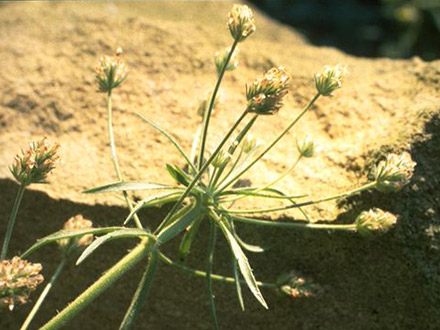Botanical name
Isapaghula, Desert Indianwheat, Blond Psyllium - Plantago ovata Forssk. (Syn. P. ispaghula Roxb.)
Family
Plantain family (Plantaginaceae)
Information about the plant
Psyllium is native to Iran and India and is cultivated there and in neighbouring countries. The genus name Plantago, derived from Latin "planta" (= foot sole, foot face) with the common suffix of plants "ago" refers in part to the flat, oval leaves of the plantain (P. major) lying closely on the ground in rosettes, on the other hand that the plantain is formed by being trampled by feet. The Psyllium-plantain, however, is characterised by small, very narrow, straight leaves. In the leaf axils of the upper leaves are the scapes with thick blossom of small flowers in short spikes. The fruit ripens into a capsule with a two-part cover each contains small, boat-shaped seeds of widely varying colour. These are reminiscent of fleas, which have earned the plant the common name "flea herb" or "flea-seed plantain" and the synonymous species name of the plant "Indian psyllium-herb".
Medicinally used parts of plants (herbal drug)
The ripe seeds are used. The drug is imported from Pakistan and India.
Constituents of the herbal drug
Indian Psyllium seeds contain mucilage in the seed coat, proteins and fatty oil in the endosperm.
Quality of the drug
The quality of the following drugs or drug preparations is specified in the European Pharmacopoeia (Ph. Eur):
- Indian Psyllium seed (semen Plantaginis ovata)
- Indian Psyllium seed husks (Plantaginis seminis tegumentum ovata)
Medical applications
Recognised medical use
Internally for recurring constipation and irritable bowel syndrome (Commission E); with recurring constipation and softening of the stools (e.g. anal fissures, haemorrhoids, following rectal examinations and pregnancy), also for short-term symptomatic treatment of nonspecific diarrhoea (E Commission , ESCOP). Clinical studies have also proven its use for bowel irregularity, irritable bowel, diverticulosis, in the presence of an artificial anus, and as a supportive measure in Crohn's disease.
The HMPC has accepted the internal use of Psyllium for recurring constipation and softening the stools as in painful bowel movements after rectal examinations or anal fissures and haemorrhoids and as "well-established medicinal use". For Indian psyllium seed husks, which have a higher swelling capacity, its application with irritable bowel syndrome and to support a cholesterol-lowering diet was also accepted ("well established medicinal use").
Traditional use
No evidence of traditional use in accordance with § 109a.
Herbal drug preparations in finished dosage forms
- whole or crushed psyllium seed or psyllium seed husks
Dosage
Indian Psyllium seeds: 8 to 40g Indian psyllium seeds (daily dose) taken in three equal doses with plenty of fluids (very important at least 200ml per dose). Indian Psyllium seeds can be taken already soaked in water, milk or juice. During therapy with psyllium an abundant intake of fluid must be guaranteed in every case.
Indian psyllium seed husk: Because in the psyllium seed husk the mucus that swells in the seed coat has a significantly greater swelling capacity than the seeds per unit weight just 7 to 11g of Indian psyllium seed husk are enough (daily dose) taken in three equal doses with plenty of fluids (very important at least 200ml per dose).
Preparation of a tea
Notes
An abundant intake of fluids is important! Psyllium seeds and seed husks may not be taken in case of suspected intestinal obstruction (ileus), diseases of the oesophagus and difficulty swallowing, and with stenosis of the gastro-intestinal tract. Psyllium seeds and seed husks should also not be taken immediately before bedtime. The use in children under 6 years old is not recommended due to the lack of experience.
Side effects
If the increased fluid intake is respected, there are no side effects to be expected, at worst flatulence.
Interactions
Indian Psyllium seed or Psyllium seed husks should be taken 1/2 to 1 hour before or after taking other medicines, as otherwise it may delay the absorption of other drugs from the gastro-intestinal tract.
References
Herbal drug monographs
HMPC, Commission E, ESCOP, WHO (Vol. 1 and Vol. 3)
Further literature
Wichtl: Teedrogen und Phytopharmaka, pg. 518
Schilcher: Leitfaden Phytotherapie, pg. 97
Van Wyk: Handbuch der Arzneipflanzen, pg. 245
Kommentar zum Europäischen Arzneibuch (Indian psyllium seed, no. 1333; Indian psyllium seed husk, no 1334)


